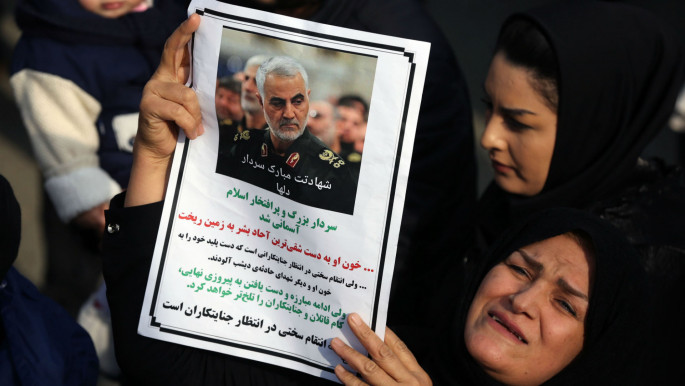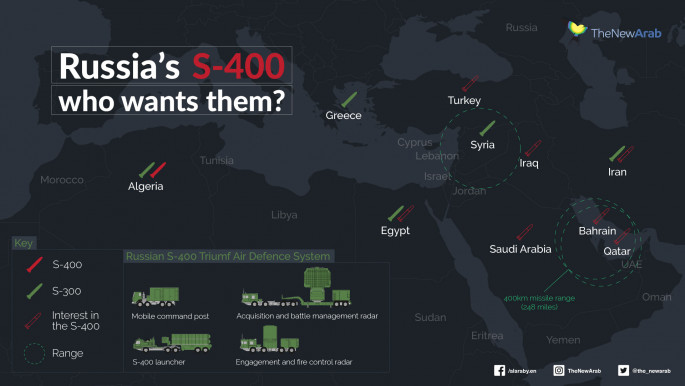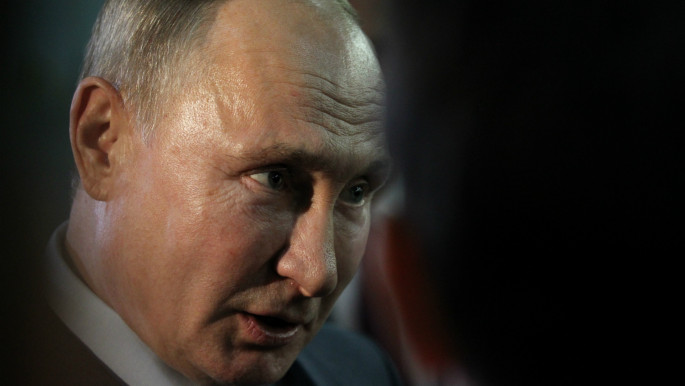Why Iraq is contemplating buying long-range Russian air defence missiles
Iraq is once again contemplating buying long-range S-400 or S-300 air defence missile systems from Russia following US drone strikes and Iranian missile strikes on its soil this month.
Karim Elaiwi, an Iraqi member of parliament on the security and defence committee, told The Wall Street Journal that no contracts have yet been signed.
"We need to get these missiles, especially after Americans have disappointed us many times by not helping us in getting proper weapons," he said.
The Journal also pointed out that the committee Elaiwi is a member of has authorised the prime minister to purchase air defence missiles, "from Russia or anyone."
The Russian state-run news agency Sputnik News reported that Iraq is in talks with Russia on an agreement to buy S-300 air defence missiles, the much older predecessor to the S-400.
The S-300 first entered service in the Soviet Union in 1979. The S-400 entered service in Russia back in 2007.
Iraq's reconsideration to buy Russian air defence missiles comes shortly after the US killing of Iranian Islamic Revolutionary Guard Corps [IRGC] Quds Force head Qasem Soleimani in a drone strike in Baghdad and the subsequent Iranian missile attack against Iraqi bases hosting US troops.
 |
| Read also: The significance of Qasem Soleimani's assassination |
Iraq has not fielded any serious air defence systems since Saddam Hussein's rule; its present air defences are very limited and short-range. Fielding S-400 or S-300s would substantially change this.
However, if Iraq does opt to buy advanced Russian missiles, it could become subject to the United States' Countering America's Adversaries Through Sanctions Act [CAATSA] federal law which, as the name suggests, aims to sanction any country that makes sizeable arms deals with Russia.
Read also: Turkey's ever-growing indigenous arms industry
Turkey's purchase of S-400s also makes it eligible for CAATSA-related sanctions, although none have yet been imposed even though Ankara began taking delivery of the system last July.
 |
|
Mohammed Raza, chairman of the Iraqi parliament's aforementioned defence and security committee, was quoted in the Russian press saying that Baghdad is "expecting a lot of opposition to the deal from the United States."
He also said that prior attempts to reach an agreement for such air defence missiles were hindered by "American threats of sanctions."
"I don't expect Russia will sell Iraq S-400s due to possible complications with both the US and Israel," Timur Akhmetov, an Ankara-based researcher for the Russian International Affairs Council, told The New Arab.
 |
I don't expect Russia will sell Iraq S-400s due to possible complications with both the US and Israel |  |
Akhmetov reasoned that Russia is more likely to sell Iraq S-300s instead of S-400s since that would less likely antagonise the US or Israel – especially since Israel has some experience evading the older missiles through training against Greek S-300 batteries in Crete in recent years.
Furthermore, Israel has been able to bomb Syria without losing any warplanes despite the fact that Damascus has possessed S-300s since late 2018.
"If Iraq really wants effective control over its own skies it should pay attention to the development of radar systems and integration of all components under one command system," he said.
"The political-strategic issue linked to that is what types of threats Iraq should expect and from where these threats should be expected.
"From the military-technical perspective, what Iraq needs is a developed system of anti-air defence."
Akhmetov suggested that Iraq could establish a formidable integrated air defence system by buying S-300s and integrating them with its existing mobile Russian-made Pantsir-S1 medium-range air defence missiles and 9K38 Igla short-range portable shoulder-fired surface-to-air missiles.
 |
|
| Read also: Russia aims to become a major arms trader in the Middle East again |
He concluded by suggesting that Iraq might "use negotiations with Russia on S-400s for political leverage in negotiations with the US over the nature of bilateral relations."
If Iraq ultimately does buy either S-400s or S-300s that would follow a growing trend over the past decade in which Baghdad has shown a preference for Russian military hardware over American.
Iraq bought Russian Mi-28 Havoc gunships instead of American AH-64 Apaches, likely because the Russian gunships are easier for Iraq to maintain and operate. Also, Russia does not impose preconditions on what Baghdad uses the military hardware it sells it for, unlike the United States.
Baghdad also bought 73 T-90 main battle tanks from Moscow instead of additional American M1 Abrams main battle tanks, of which it operated a fleet of 140.
In mid-2018, the Iraqi Army notably replaced the 9th Division's 35th Brigade's Abrams tanks with its new Russian T-90s.
The most hi-tech warplanes in the Iraqi Air Force today is undoubtedly its fleet of 36 US-built F-16 Fighting Falcons.
American advisers and technicians based at Iraq's Balad Airbase were reportedly ordered to leave this month due to threats of more attacks by Iran-backed Shia paramilitaries in Iraq. On January 12, four Iraqi Air Force personnel were injured by eight Katyusha rockets fired at Balad.
Without continued US technical support, and undoubtedly without a steady supply of spare parts, many of Iraq's F-16s may end up grounded in the not-too-distant future.
Furthermore, if ties between the US and Iraq are strained as a result of the present tensions or something else down the road, US sanctions against Baghdad could potentially ground the entire fleet.
Consequently, Iraq may then have to look elsewhere for fighter jets, which Russia may also offer down the road.
In October 2017, the Kurdish Peshmerga conclusively proved that Iraqi Shia-majority paramilitaries were operating Iraqi M1 Abrams tanks, by destroying one that was being used against them. The fact that the Hashd were using M1s was in direct violation of the end-use conditions under which they were supplied to Iraq.
After the Abrams' manufacturer, General Dynamics suspended its technical and maintenance support Iraq quickly proved incapable of maintaining the tanks on its own. The same would more likely than not happen its F-16 fleet if the US withdraws its continued maintenance and technical support.
It would not be all that surprising or unprecedented if Iraq increasingly relies more on Russia for its military hardware going forward.
Paul Iddon is a freelance journalist based in Erbil, Iraqi Kurdistan, who writes about Middle East affairs.
Follow him on Twitter: @pauliddon





 Follow the Middle East's top stories in English at The New Arab on Google News
Follow the Middle East's top stories in English at The New Arab on Google News


